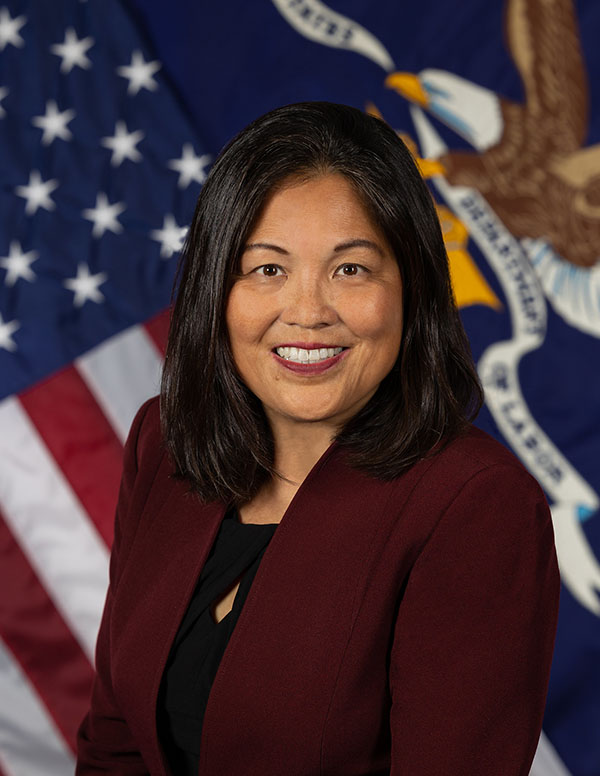Despite numerous calls from Republican lawmakers not to resubmit Julie Su’s nomination to be Secretary of Labor, President Biden has done just that.
 The White House on Jan. 8 announced that it was resubmitting Su’s nomination to the U.S. Senate for consideration. The Biden administration had previously announced Su’s nomination in February 2023, following the departure of former Labor Secretary Marty Walsh, but she was unable to garner enough support in the U.S. Senate to be confirmed.
The White House on Jan. 8 announced that it was resubmitting Su’s nomination to the U.S. Senate for consideration. The Biden administration had previously announced Su’s nomination in February 2023, following the departure of former Labor Secretary Marty Walsh, but she was unable to garner enough support in the U.S. Senate to be confirmed.
Even though President Biden is standing by Su, her path to confirmation by the narrowly divided Senate remains a challenge, as it does not appear any senator has changed their position, including that of Sen. Joe Manchin (D-WV), who announced last summer that he would oppose Su’s nomination. Sens. Jon Tester (D-MT) and Kyrsten Sinema (I-AZ) also appeared to be leaning against her nomination. Democrats currently control the Senate 51-49 with the support of three independents who caucus with the party.
Since the departure of Walsh, Su has been serving as Acting Secretary of Labor under the Department of Labor’s (DOL) succession statute, which the Biden administration contends allows her to continue serving as Acting Secretary because she was previously confirmed as Deputy Secretary.
That temporary status was further bolstered after the Government Accountability Office concluded last fall that Su is “lawfully serving as the Acting Secretary under 29 U.S.C § 552 (section 552).” This finding came in response to a request by House Education and the Workforce Committee Chairwoman Virginia Foxx (R-NC), who asked GAO to examine whether Su serving in an acting capacity is subject to time limits under the Federal Vacancies Reform Act of 1998. GAO concluded, among other things, that the Vacancies Act’s time limitations on acting service do not apply to the Acting Secretary’s service.
Meanwhile, prior to President Biden’s announcement, several congressional Republicans again called on the administration to not resubmit Su’s nomination to be Labor Secretary. Those calls most recently came from Chairwoman Foxx (R-NC) and Workforce Protections Subcommittee Chairman Kevin Kiley (R-CA), who in a Jan. 4 letter to Biden requested that he not renominate Su.
“By failing to take the Senate’s inaction on Ms. Su’s nomination as a sign that it is unacceptable to the American people, you have ignored the separation of powers vital to the Constitution. It is time for you to remedy this travesty,” Reps. Foxx and Kiley wrote. “Accordingly, we respectfully request you select a new nominee to become the next Secretary of Labor and that you end Ms. Su’s tenure as Acting Secretary of Labor.”
Without citing the GAO analysis, the pair contend that the Biden administration’s “questionable interpretation” relying on the Deputy Secretary of Labor statute caused the Committee to take legislative action last September when it favorably reported H.R. 4957, the Department of Labor Succession Act. That bill, they note, seeks to ensure that the Deputy Secretary of Labor cannot serve indefinitely as the Acting Secretary of Labor by clarifying that the Vacancies Act is the statute governing a temporary vacancy within the office of the Secretary of Labor.
Similarly, Sen. Bill Cassidy, M.D. (R-LA), who serves as the ranking Republican member of the Senate Health, Education, Labor and Pensions (HELP) Committee, called on Biden to submit a new Labor Secretary nominee after Su’s nomination was returned to the White House without being confirmed following completion of the first session of the 118th Congress.
“It is clear Ms. Su lacks the necessary votes for confirmation. I urge President Biden to put forward a nominee who is committed to fair enforcement of our nation’s labor laws and is capable of being confirmed in the Senate,” Sen. Cassidy stated.
Why Is This Important?
One key reason is that it is anticipated that Julie Su’s status as Acting Labor Secretary will be used as an argument against any forthcoming regulatory guidance issued by the Department of Labor—particularly the recently proposed fiduciary investment advice rule. A number of industry organizations contend that she lacks authority to finalize the proposed regulation while serving in an acting capacity.
Meanwhile, a bipartisan group of House lawmakers on Jan. 8 urged the DOL to withdraw its investment advice fiduciary proposal, also known as the Retirement Security Rule.

